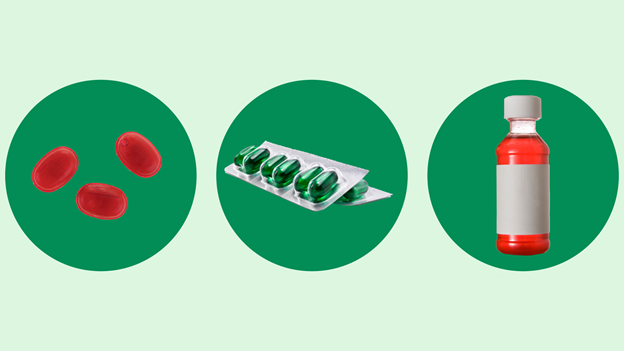Dealing with a persistent cough, whether it’s due to a cold or another ailment, can be quite vexing and uncomfortable, particularly when you’re attempting to unwind or get some rest. Many of us instinctively turn to over-the-counter cough remedies at the first sign of a tickle in the throat. However, with an overwhelming array of brands lining the store shelves, how can you determine which cough medicine is the most suitable for your specific situation?
We consulted with experts to explore the various categories of cough medicine, when they are appropriate, and when opting for a more natural cough remedy might be advisable.
Varieties of Coughs
Coughing serves as your body’s mechanism for keeping your throat and airways clear. It’s a reflex designed to protect your well-being and promote healing, triggered by various conditions and circumstances, ranging from the common cold to chronic bronchitis.
Coughs can be categorized into two types: acute and chronic.
- Acute coughs: These typically accompany a cold or flu and typically endure for about two to three weeks. Most over-the-counter cough medications are formulated to address acute coughs.
- Chronic coughs: This variety lingers for more than three weeks and can be induced by conditions such as asthma, chronic bronchitis, allergies, chronic obstructive pulmonary disease (COPD), smoking, and certain medications.
Many forms of chronic cough, like those caused by smoking, emphysema, chronic bronchitis, and pneumonia, should not be treated with cough medicine because your body uses the cough reflex to keep your lungs clear.
Types of Cough Medicine
Much like there are different types of coughs, there are two primary categories of over-the-counter cough medications intended to alleviate acute coughs associated with colds or the flu.
- Antitussives: Also known as cough suppressants, antitussives hinder the cough reflex by reducing activity in the brain region responsible for triggering coughing. Some brand names include Triaminic Cold and Cough, Delsym and Robitussin Cough.
- Expectorants: This type of cough medicine works to thin mucus, facilitating the removal of mucus and clearing the airway. Two notable expectorant brands are Mucinex and Robitussin Chest Congestion.
The choice between these cough medicines depends on your specific issue. As Dr. Niraj Patel, a board-certified family medicine physician and medical director of GoodRx Care, explains, “Expectorants are typically used for wet coughs (caused by the common cold, bronchitis, etc.) to help clear respiratory tract congestion, while antitussives are employed for dry coughs to control the cough reflex, especially useful for those whose dry coughs disrupt their sleep.”
Prescription Cough Medicine
For most individuals, over-the-counter cough medicine proves effective in relieving symptoms. However, in certain instances, a doctor may deem prescription cough medicine necessary. Hydrocodone and codeine are two of the most common ingredients found in prescription cough medicines.
- Hydrocodone: An opioid cough suppressant, hydrocodone is employed to treat a persistent dry cough. It affects the brain region responsible for the cough reflex. Hydrocodone is not suitable for individuals under 18 and carries a high risk of misuse and dependency, as well as potential side effects such as drowsiness, nausea, and constipation.
- Codeine: An opioid pain reliever, codeine is frequently combined with other medications to alleviate coughing. Like hydrocodone, codeine targets the brain area responsible for the cough reflex and seeks to reduce its activity. Codeine should not be used in children under 18, poses a risk of addiction, and may lead to severe side effects, including stomach pain and urination difficulties.
People with a history of substance misuse and those with underlying lung conditions like emphysema should exercise caution when using cough medications containing codeine or hydrocodone, as these substances can suppress breathing function, warns Dr. Elliot Dinetz, a double board-certified family and functional medicine physician.
“Hydrocodone and codeine are not commonly employed in treating coughs due to their addiction potential and potential sedation,” concurs Dr. Patel.
Best Cough Medicine for COVID-19
Although several treatments are available for COVID-19, including monoclonal antibody therapy and antiviral medications like Paxlovid, if you and your doctor have determined that you have a mild case that can be managed at home, you can alleviate your COVID-19-induced cough using the same methods employed for cold or flu-related coughs—home remedies and over-the-counter cough medicines, if desired.
Natural Cough Remedies
While cough medicine can offer symptom relief, there are several home remedies that may also be effective in alleviating an irritating cough resulting from a cold or the flu.
- Marshmallow root: Marshmallow root has a longstanding history as a naturopathic cough remedy, and scientific evidence supports its efficacy. A 2018 study found that individuals who consumed a lozenge or syrup containing marshmallow root reported a significant improvement in their dry cough symptoms, with relief occurring within 10 minutes.
- Honey: According to a 2020 review in BMJ Evidence-Based Medicine, honey may be more effective than standard care alternatives in reducing cough frequency and severity. Dissolving a teaspoon of honey in tea or hot water, particularly before bedtime, has demonstrated efficacy.
- Ginger: Ginger may act as a natural cough suppressant and has been shown to relax the trachea’s airway muscles. Boil peeled and chopped ginger root to make tea, or add grated ginger to hot water for potential relief.
- Staying hydrated: Adequate hydration can help thin mucus, playing a crucial role in the expectoration process.
Dr. Patel recommends hydration, honey (for those over 1 year of age), and cough lozenges as general advice for managing acute coughs, rather than opting for over-the-counter products like antitussives or expectorants.
How to Choose the Most Suitable Cough Medicine for You
While numerous cough medicine brands are available, for most cases of acute cough (typically associated with a cold or flu), home remedies may be as effective as over-the-counter antitussives and expectorants, says Dr. Patel. He suggests sticking to cost-effective and less harmful therapies like fluids, honey, and cough lozenges for self-limiting acute coughs that are expected to resolve on their own.
If your cough persists, it’s advisable to consult your doctor to uncover any underlying causes, says Dr. Dinetz. Chronic coughs may be attributed to conditions such as cough-variant asthma and acid reflux, both of which necessitate evaluation for more suitable treatment options.
Side Effects of Cough Medicine
While most individuals can tolerate cough medicine when taken as directed, certain considerations should be kept in mind.
Some over-the-counter cough medicines contain alcohol, which may not be suitable for everyone. Additionally, specific cough medicines may interact with other medications you are currently taking, such as antidepressants and sedatives.
Individuals with asthma, high blood pressure, glaucoma, heart failure, or an enlarged prostate should consult their doctor before trying over-the-counter cough medicine, as it may have adverse effects on their health.
If you are taking other medications or have a chronic health condition, it’s advisable to discuss the most appropriate cough medicine for your specific circumstances with your doctor.
When to Consult a Doctor About a Cough
Most coughs should resolve within three weeks. If your cough persists beyond this timeframe, especially if it is severe, impairs your sleep or concentration, leads to coughing up blood, causes shortness of breath or chest pain, or results in neck lumps or swelling, it is crucial to seek guidance from your doctor. When faced with concerning or unimproving symptoms, consulting your primary care doctor before relying on over-the-counter medicine is a prudent course of action.




